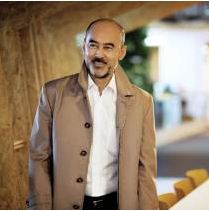Language a legacy of the Olympics

Enio Ohmaye, Education First Chief Technology Officer, Brazil
Brazil is planning to teach English to a million of its citizens before the start of the Rio Olympic Games scheduled for 2016.
The Brazilian Olympic Committee is partnering with the Brazilian Ministry of Education and international learning provider Education First (EF) to deliver the initiative.
EF is opening up its online language learning platform, EF Englishtown, to 550,000 high school students and 450,000 Olympic volunteers for free.
And it has announced a new partnership with the Ministry of Education to deploy a new language assessment test, called the EFSET, that can help determine what level of proficiency these new English learners already have, as well as measure their proficiency after taking the online courses.
“The point of doing this is to leave a legacy, so that after the Olympics you don’t just end up with an empty Olympic town,” says EF’s Chief Technology Officer Enio Ohmaye says.
“That legacy is education and what we believe learning English can do for a country.”
This partnership is just the latest example of how countries are using emerging online education platforms to drive social change locally.
Countries like France, China, and even Saudi Arabia have recently partnered with the non-profit education company, edX, to launch their own so-called “massively open online courses” or MOOCs in recent years.
They are using these courses to teach tech courses or provide education to women and disadvantaged citizens. These new tech platforms give countries a way to scale education at a low cost.
But Education First is significantly more established than any of the new online platform providers.
Founded in 1965 by Swedish billionaire Bertil Hult, it employs more than 25,000 teachers in more than 400 brick and mortar schools across 50 countries.
Englishtown is EF’s online platform launched in 1996.
Because of its extensive experience in the industry, Englishtown takes a fundamentally different approach to online learning than newer platforms. For one thing, you have to pay to use it.
Mr Ohmaye says that is because paying even a small amount for a course gives students more incentive to follow through. And students who sign up for Englishtown get 24-7 access to live teachers who need to be paid.
So, offering the classes for free in Brazil comes at a substantial cost, to Education First and its local sponsors in Brazil.
Mr Ohmaye says freely that this is just an “entry point” to build some awareness among Brazilians about the importance of learning what is quickly becoming the universal language.
“It’s a long journey before we can change a country, but we are talking about a million people, not hundreds or thousands,” he says. “That kind of scale allows us to have an impact.”
The initiative is close to Mr Ohmaye’s heart.
His childhood was affluent with his father running a thriving imports business, selling fine crystals and luxury watches to wealthy government employees in Brazil’s capital city, Brasilia.
But in 1964, the Brazilian government was overthrown by a military coup, and the fallout saw Mr Ohmaye’s father go bankrupt.
After years of struggling in Brazil, Mr Ohmaye bought a ticket to the US so he could work as a “bus boy” at a country club in New York State.
A year later, having saved a little money, he moved back to Brazil to get a degree in computer programming.
Mr Ohmaye says the course was much easier for him than most of his classmates.
“I could read the manuals, they were written in English” he says.
“My English was so good compared to the students next to me. It completely changed my life.”
Now he wants to change other lives in the same way.
Sheree Peterson
AMES Staff Writer












